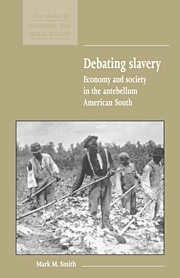Book contents
- Frontmatter
- Contents
- List of figures
- List of tables
- Preface
- 1 The contours of a debate
- 2 Slaveholders and plantations
- 3 Yeomen and non-slaveowners
- 4 Slaves
- 5 The profitability of slavery as a business
- 6 The Profitability of slavery as a system
- 7 New directions, toward consensus
- Bibliography
- Index
- Economic History Society
- New Studies in Economic and Social History
- Studies in Economic and Social History
5 - The profitability of slavery as a business
Published online by Cambridge University Press: 05 June 2012
- Frontmatter
- Contents
- List of figures
- List of tables
- Preface
- 1 The contours of a debate
- 2 Slaveholders and plantations
- 3 Yeomen and non-slaveowners
- 4 Slaves
- 5 The profitability of slavery as a business
- 6 The Profitability of slavery as a system
- 7 New directions, toward consensus
- Bibliography
- Index
- Economic History Society
- New Studies in Economic and Social History
- Studies in Economic and Social History
Summary
Any discussion of how best to characterize the nature of southern slavery must at some point address the slippery and elusive question of profitability. To this end, this and the following chapter are premised on the distinction made by Harold Woodman and others between slavery as a business and slavery as a system (Woodman, 1963; 1972; Phillips, 1906). Although the two were intimately linked, for the purposes of historical analysis it is useful to consider slavery as a business and as a system discretely. The former evaluates slavery from the micro-economic level, that is, from the plantation. The focus of this chapter is on the efficiency of the plantation as a business. Chapter 6 considers the profitability of slavery as a system which examines the macro-economic impact of slavery on the region's economy.
Before discussing either the macro or micro efficiency and profitability of slavery, it is worth noting what historians mean when they talk about efficiency and profitability. Unfortunately, there is often little definition of these terms. Historians sometimes write as though there existed an absolute level of profitability for which planters strove. Other times, questions of efficiency and profitability are improperly conflated. After all, as Peter Parish points out: “Profitability and efficiency are not quite the same thing. Profit may result, and often does result, from efficiency, but it may also arise from other causes – ruthless and extravagant exploitation of forced labor or virgin land or natural resources, or a monopoly or near-monopoly position as supplier of a product in urgent demand” (Parish, 1989, p. 44).
- Type
- Chapter
- Information
- Debating SlaveryEconomy and Society in the Antebellum American South, pp. 60 - 70Publisher: Cambridge University PressPrint publication year: 1998



